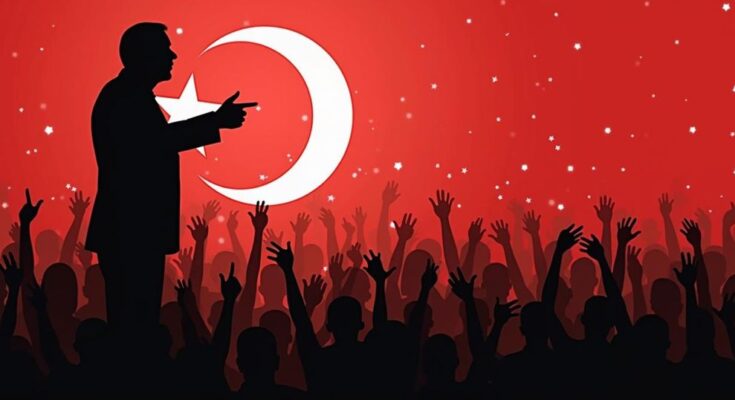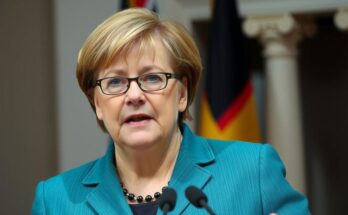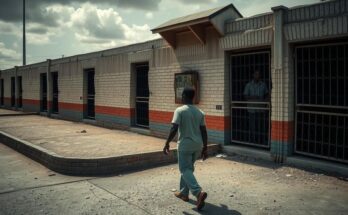Incumbent President Kais Saied is expected to win a second term in Tunisia’s presidential election with 89.2% of the vote, amidst allegations of electoral integrity issues and a historic low voter turnout of less than 28%. His main rivals are either imprisoned or have faced significant challenges that inhibited their candidacy. The broader context involves a regression of democratic progress in Tunisia, exacerbated by economic difficulties during Saied’s governance.
On Sunday evening, polls closed in Tunisia’s presidential election, with incumbent President Kais Saied poised for a second term, according to an exit poll that suggests he will secure approximately 89.2% of the vote. However, this election has been criticized by the opposition for its perceived lack of credibility and integrity, as serious contenders were barred from participating, while one of his rivals, Ayachi Zammel, is imprisoned. The voter turnout for this election was reported to be less than 28%, marking the lowest participation in a presidential election in Tunisia since the 2011 revolution. Saied’s two challengers were significant figures in the political arena. Zouhair Maghzaoui, a former lawmaker who initially supported Saied’s power consolidation in 2021, is expected to gain only 3.9% of the votes, while Zammel, despite his incarceration on charges of forgery, may secure about 6.9% of the vote. Notably, other prominent opposition leaders, including Rached Ghannouchi and Abir Moussi, are also imprisoned or barred from competing, and a recently reconstituted electoral commission appointed by Saied has excluded these leaders from the race. The backdrop of this election highlights Tunisia’s troubled path post-revolution. Initially viewed as a beacon of hope in democratic transition following the ousting of autocrat Zine El Abidine Ben Ali in 2011, Tunisia has seen a regression under Saied’s governance. After winning a landslide victory in 2019, Saied dissolved the parliament and restructured the constitution, evoking memories of the former regime’s authoritarianism. According to Human Rights Watch, over 170 individuals have been detained for political reasons or for merely exercising their basic rights. Despite these alarming trends, Saied refutes allegations of dismantling democracy, accusing his adversaries of treachery. Further compounding Saied’s challenges is Tunisia’s ongoing economic crisis, characterized by shortages of basic goods, high inflation, widespread unemployment, and insufficient infrastructure. His reluctance to initiate necessary but unpopular economic reforms has hindered the possibility of securing crucial loans from the International Monetary Fund (IMF). Tunisia’s economy continues to rely heavily on recovering tourism and conditional support from the European Union, necessitating a firm stance against irregular migration. If the projected results are confirmed, Saied will continue to govern a nation increasingly marked by political repression and economic instability.
The article discusses Tunisia’s presidential election, which has garnered significant attention due to its implications for the country’s democratic trajectory. Following the 2011 revolution, Tunisia was lauded as a model for democratic reform in the Arab world. However, in recent years, President Kais Saied’s consolidation of power has raised concerns about the erosion of democratic norms. Saied’s government has faced criticism for excluding key political adversaries and curbing dissent, leading to questions of legitimacy surrounding the electoral process.
The recent presidential election in Tunisia underscores a critical juncture for the country’s political landscape. Despite the projected overwhelming victory for President Kais Saied, the severe voter turnout reflects widespread disillusionment among the populace. With significant opposition figures imprisoned and a rapidly deteriorating economic situation, the future of democracy in Tunisia remains precarious. As Saied prepares for a new term, the nation stands at the crossroads of potential autocracy and a restless demand for reform from its citizens.
Original Source: www.dw.com




